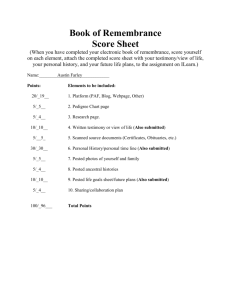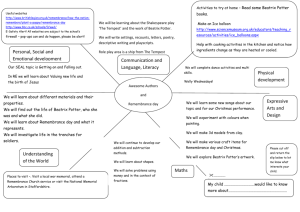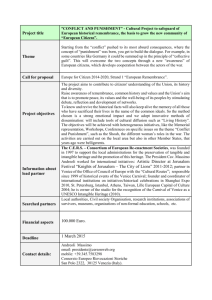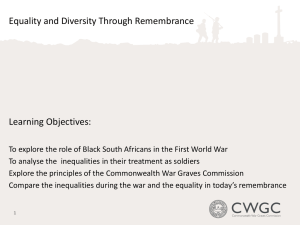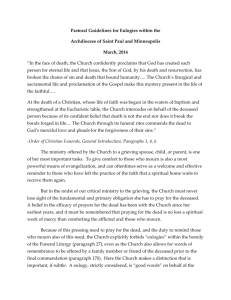Remembrance Day Sermon 2005 - Holy Trinity Penn & St Margaret`s
advertisement
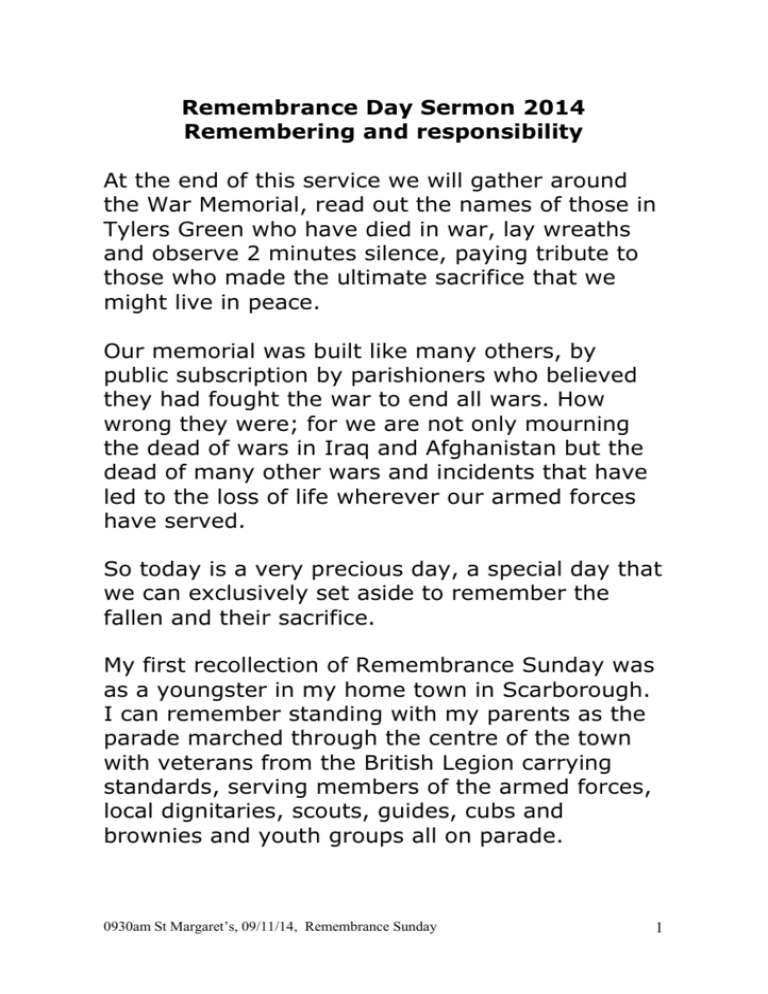
Remembrance Day Sermon 2014 Remembering and responsibility At the end of this service we will gather around the War Memorial, read out the names of those in Tylers Green who have died in war, lay wreaths and observe 2 minutes silence, paying tribute to those who made the ultimate sacrifice that we might live in peace. Our memorial was built like many others, by public subscription by parishioners who believed they had fought the war to end all wars. How wrong they were; for we are not only mourning the dead of wars in Iraq and Afghanistan but the dead of many other wars and incidents that have led to the loss of life wherever our armed forces have served. So today is a very precious day, a special day that we can exclusively set aside to remember the fallen and their sacrifice. My first recollection of Remembrance Sunday was as a youngster in my home town in Scarborough. I can remember standing with my parents as the parade marched through the centre of the town with veterans from the British Legion carrying standards, serving members of the armed forces, local dignitaries, scouts, guides, cubs and brownies and youth groups all on parade. 0930am St Margaret’s, 09/11/14, Remembrance Sunday 1 At this young age I didn’t understand the significance of it all. I was born towards the end of the war with little recollection of hardship and in my teen years it seemed to me to be a pointless gesture that had little to say to someone born after 1945. And I certainly struggled in my youth with the idea that God was solely on our side. How on earth could we disenfranchise the thousands upon thousands of Christians who were fighting against us? It seemed to me that there was a certain irony that German Christian pastors were praying for victory at the very same time that our chaplains were doing the same. It certainly begged the question; - did the other Christians get it wrong? Did God choose us rather than them! Looking back my discomfort was I think, because I didn't understand the whole picture, a picture of emotions and passions that could only come from those who had either experienced first hand the horrors of war or had been parted from loved ones for long periods of time. But today I believe that Remembrance Day and the act of remembering is precious. The mere act of remembering helps us to understand the sacrifices that were made and the value of peace. Through the stories of particular people and the memories of those whose lives have been turned upside down by war and the effects of terrorist 0930am St Margaret’s, 09/11/14, Remembrance Sunday 2 activity, we have a chance to try to understand where we all fit into the dark picture of these emotions and fears that refuse to go away and that still appear on our TV screens and in our consciences. And today as we watch war taking place in almost real time on television we ought to reflect thoughtfully on the consequences. Every bullet fired; every drone or aircraft strike; every vehicle spectacularly blowing up means that there is someone dying or being maimed at the other end. This is not a shoot-em up computer game, this is for real. Over the past few years we have shared in the dignity of the corteges processing through Royal Wooton Basset and Brize Norton on what was a regular event. Through the media we can feel and share in the grief of families of soldiers and civilians killed in Iraq, Afghanistan, Syria, Palestine or elsewhere. We can share the grief of those caught up in the silent war of terrorist outrages. All these things open up new emotions and perspectives about warfare. Because of the media we all have a common experience of the grief of others. My generation brought up during the Cold War were protected from personal contact with the effects that war tears into individual and family life. The media has changed all of that and we can now empathise with those for whom the horrific experience of war 0930am St Margaret’s, 09/11/14, Remembrance Sunday 3 lives quietly and persistently with them all their days. And so today, we remember Those whose lives and loves have been wrecked by war. Those, who take decisions that can wound or heal, can mean life or death for someone. Those who have committed their lives to serve in the armed forces and emergency services and live with the possibility of being killed in action Those whose names are on our memorial in our churchyard or indeed on other memorials whether in this country or abroad Remembrance Day is a day when each one of us faces their own vulnerability, whether in the face of the violence of warfare or terrorism, or in relationships gone wrong, rights ignored or ambition for the sake of power. What we do know is that gap between media reporting and actual experience of war is notoriously difficult to bridge. War reporters and cameramen spread the illusion that we know what's going on. But despite our sophisticated means of communication, we just don't get the full picture. All we get are sound or vision bites designed to fit a time slot on the news. 0930am St Margaret’s, 09/11/14, Remembrance Sunday 4 So it’s critically important that we at least try to understand what is behind these stories . For all of us here are the beneficiaries of a democracy for which today's wars are being fought and for which young men and women from this country and from other parts of the world together with innocent civilians are being killed. And it seems to me that that imposes responsibilities on us. These wars are being fought in our name and we must try to understand the reasons why. We must keep asking the questions 'Why are our forces there? What are they fighting and dying for? What are we trying to achieve? Modern war is no longer as clear cut as the two world wars. It is waged across deserts and continents and places with strange sounding names. It is waged both with primitive and with sophisticated weaponry. Through the suicide bomber, the terrorist has brought war to our own doorstep. It says in Thessalonians ‘that the day of the Lord will come like a thief in the night – there is peace and security, then sudden destruction will come upon them’. 0930am St Margaret’s, 09/11/14, Remembrance Sunday 5 And for those who have been killed whether in a bazaar in Kabul, a train in Madrid or a tube train in London the destruction is sudden. So I believe that each day is a precious gift, and it places on all of us the responsibility to use it well, with clear purpose. Life isn't a dress rehearsal, the drama is now. In a war, where civilians face the incomprehensible terror of the suicide bomber, we can't rely on the formulae of the past. We must dig deep into the resources of our faith and refashion them for today's need. So where as Christians do we start the process of gaining peace and reconciliation? I was reminded of the words of Archbishop Rowan Williams after the attacks on the Twin Towers, He reflected on how we should respond to the language of hatred and violence that had been articulated that day. ‘If we choose to continue the conversation in the same language of violence and hatred, we will be drawn deeper and deeper into the hatreds of those who hate us. And we will become imprisoned by them’. Perhaps that's what Jesus meant when he said we should love our enemies. Love and peace is the only the language that releases any of us from a spiral of death and injustice. 0930am St Margaret’s, 09/11/14, Remembrance Sunday 6 "What might that mean? "Well, when the awful wars in Afghanistan, Syria and elsewhere are over, I hope that the images that we remember are those of the British soldiers patrolling without their helmets in Kabul; the images of soldiers talking to local families, building schools and hospitals and giving sweets to children. The images of aid workers installing solar powered pumps so that villages can have fresh and clean water. The images of children especially young girls being educated Because these are powerful images - they express our commitment to building peace, our commitment to breaking the cycle of conflict. These images encapsulate the vulnerability that is part of building trust. They show professionalism in our armed forces and aid workers; a professionalism that is prepared to take risks. Perhaps it even transforms the skills of war into the tools of peace. I end with a quote from Archbishop Desmond Tutu who said ‘In the end what matters is not how good we are but how good God is. Not how much we love Him but how much He loves us. And God loves us 0930am St Margaret’s, 09/11/14, Remembrance Sunday 7 whoever we are, whatever we’ve done or failed to do, whatever we believe or can’t believe.’ This kind of love isn't comfortable and doesn't have quick results. It’s vulnerable to going pear shaped or being misunderstood. We so often ask the question ‘what would Jesus do? "Jesus said: 'This is my commandment, that you love one another as I have loved you.' It seems to me that nothing else can heal our torn and broken world." Amen 0930am St Margaret’s, 09/11/14, Remembrance Sunday 8
